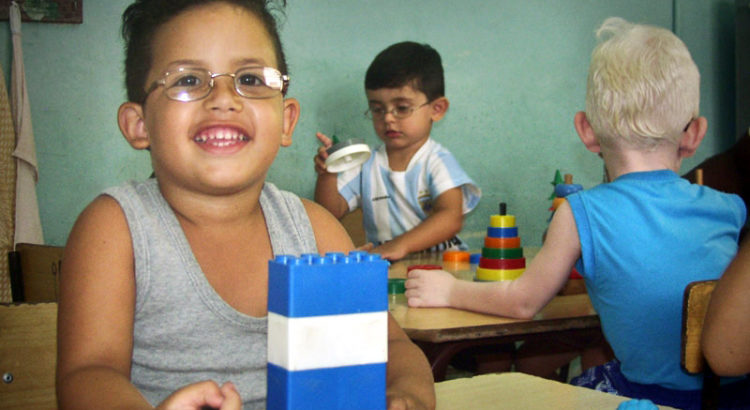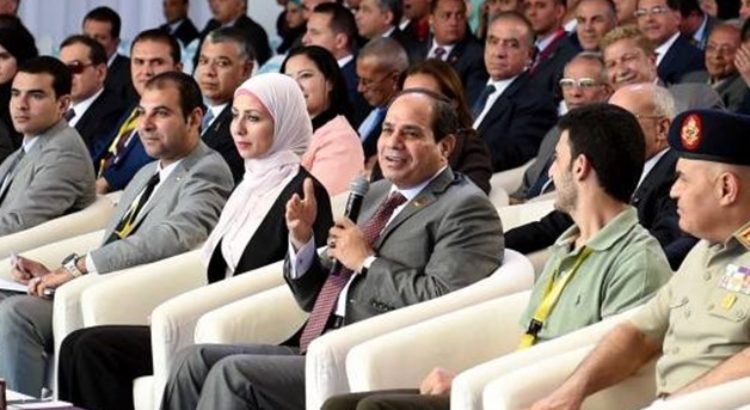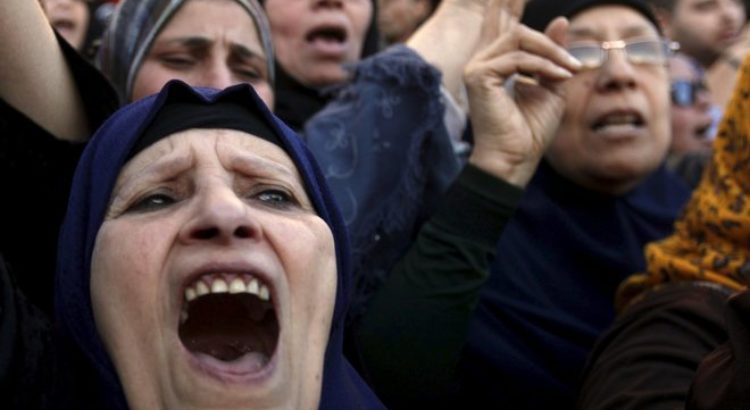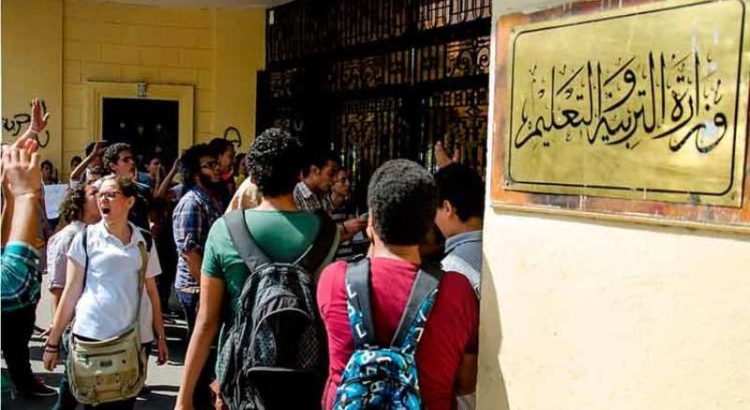Africa/ Egypt/ 20.10.2018/ Source: www.alaraby.co.uk.
In short, it hopes to have its cake and eat it too, with «reforms», designed to both mitigate public criticism of the quality and expense of education, as well as to produce skilled, disciplined youths supportive of military rule.
‘Reforms’ of public education
The military dominated government has recently launched three initiatives to achieve these possibly contradictory objectives. The first is broad reform of public primary, preparatory and secondary education, which includes some 20 million students in about 60,000 public schools.
Supported by a World Bank loan of $500 million, the new programme is to expand kindergarten education for 500,000 children, create 50,000 new teaching jobs and provide up to 1.5 million digital-learning devices to high school students and teachers. It will replace the existing general secondary school examination at the end of high school with a dozen exams spread over three years.
Laudable as these reforms are, they are unlikely to rapidly transform the abysmal quality of Egyptian public education, currently ranked by the World Economic Forum as 130th out of 137 in the world, with primary education ranking 133rd, Egypt’s lowest ranking on the almost 100 indicators from which the Global Competitiveness Index is constructed.
| Their aim is to induce discipline and loyalty, especially to the military, while opening a recruitment channel into the military controlled elite |  |
Although some 90 percent of the Ministry of Education’s budget is allocated to personnel salaries, teachers are very poorly paid so typically moonlight or extract fees for private tutorials from their students, the latter of which have resulted in household expenditure on education exceeding that of the government.
About one third of teachers are «not educationally qualified» and professional development programmes are «seriously deficient«.
The hurdles to be overcome, in short, are high and require budgetary outlays beyond those currently, or in the foreseeable future, likely to be made. Tariq Shawki, Minister of Education, estimates the envisioned reforms will cost $1.5 billion in addition to the World Bank’s $500 million, noting that his projections indicate it will take 14 years for that amount to be allocated.
Read more: Egypt governor bans ‘unpatriotic’ Mickey Mouse from schools
The 2014 constitution stipulates that public education receive 4 percent of government expenditures, a proportion yet to be reached since the constitution was ratified. The maximum proportion allocated to education in republican Egypt was 5.7 percent in 1983. Government expenditure as a proportion of GDP has fallen steadily since the 1960s, at 10 percent now less than half of what it was then. Education is thus receiving a smaller slice of a proportionately smaller pie.
Of public funds spent on education, some 30 percent go to tertiary institutions, whose enrollments, which were 2.7 million in 2017, constitute about 12 percent of all students.
In the Middle East and North Africa as a whole, 24 percent of public expenditure on education is for the tertiary sector, the second highest rate in the world, led only by North America.
But whereas North America has more universities in the world’s top 500 than any other region, none of Egypt’s 24 public universities is in the top 500. Its top five public universities fall into the 500-1,000 range.
Privatisation, nationalism and discipline
The government’s second educational initiative is to privatise as much education as possible at all levels. About ten percent, or some two million of the country’s 18-20 million (the figures vary) primary and secondary students, are in private schools.
Of the country’s 50 universities, 26 are private, with annual tuition fees ranging from $1,000 to $4,000, as compared to $50 on average at public universities. In August 2018 President Sisi signed a new law making it easier for foreign universities to open branches in Egypt, at which time the minister of higher education announced that six new international universities would be established in 2019.
Sisi had stated in March 2018, that no new university could be established without being in partnership with one of the world’s top 50 universities and that «we are not ranked in the top 500 universities in the world. I will return Egyptian universities to the top 50.»
While encouraging privatisation, the government is simultaneously bringing private schools and universities under more direct, obtrusive control, Sisi’s remarks just quoted indicating one of the new constraints placed on private universities.
As for pre-tertiary private schools, the big change is the Arabisation of the first six years of teaching, including mathematics and science, with English being taught only as a second language during that period, including in the so-called «language schools», which have always taught in English and whose share of age cohorts has been steadily increasing since the Mubarak era.
 |
While encouraging privatisation, the government is simultaneously bringing private schools and universities under more direct, obtrusive control |  |
This move has been strongly criticised by parents and teachers, but to no avail. What seems a related change is a new requirement «agreed» between the ministry of education and the chairman of the International Schools Association, that international schools «teach school subjects that are related to the national identity in line with the international curricula«.
These changes, reminiscent of similar ones in the Nasser era, are presumably intended to promote Egyptian nationalism. They are, moreover connected to the broader, third educational initiative, which is to induce discipline and loyalty, especially to the military, while opening a recruitment channel into the military controlled elite.
An anecdotal example of this initiative was provided by a visit by the governor of Qalyubiya Province to a kindergarten, where he spied images of Disney characters, including Mickey Mouse, on the walls.
He immediately decreed that they be replaced by drawings of «military martyrs, so that children will look up to them as role models. These characters are US made, whereas we have our own noble figures who can deepen children’s patriotism and love of country.» The Ministry of Education immediately picked up the theme, announcing the formation of a committee to implement the order.
A more systematic initiative was the launching of 79 of what is ultimately intended to be 200 «Japanese schools» in the 2018 school year, which more than 30,000 students are now attending.
Supported by the Japanese International Cooperation Agency, the declared purpose of the schools, according to the Japanese Ambassador to Egypt, is to «teach students the main principles of discipline, commitment, and respect for time».
The special curricula and teaching method is referred to as Tokkatsu, which is intended to produce a «balanced development of intellect, virtue and body by ensuring academic competence, rich emotions and healthy physical development.»
Education Minister Tariq Shawky declared at the opening of one of the schools that «the goal of the new educational system is to build a new, different Egyptian generation.» The schools will teach the Egyptian curriculum but include «distinctive features of Japanese education,» including «cleanliness and self-reliance.»
Emphasis on discipline in the new, so-called Cumulative Secondary School system was underscored by the distribution to all students entering high school, of Samsung tablet computers, which have the capacity to monitor the location of students, hence to enforce attendance rules, which will require students to be present a minimum number of days to be eligible to sit for compulsory examinations.
The ministry of education announced in October 2018 that it had prepared a law criminalising «unauthorised education centres» calling for imprisonment of offenders – presumably teachers offering private tuition.
The draft law also calls for imprisonment of students who verbally abuse or hit their teachers. The overall emphasis on order and discipline was underscored by President Sisi himself, who at the outset of the new school year publicly informed the minister of education that «I am going to visit lots of schools and I am going to sit with my grandchildren in order to follow up on the quality of the education.»
The military as educator
As with the civil service and the private business sector, the military appears also to have decided that it can educate better than others, so has become an education service provider in competition with both public and private schools.
As part of its counter-terror campaign, it opened four new primary schools in north and central Sinai under the control of the Commander of the East of the Suez Canal Counter-Terrorism Forces. An opening ceremony for one, held on the 45th anniversary of the October War «victory», was attended by the Commander of the Third Field Army.
 |
The big change is the Arabisation of the first six years of teaching |  |
The jewel in the crown of the military pre-tertiary educational system is the Badr International School, opened in a military zone on the outskirts of Cairo in 2015, two years after the then defense minister, Abdel Fattah al-Sisi, issued the order for its creation.
A reporter who visited the school observed that its «managers and staff see their role not only in educational terms, but as a patriotic duty, holding themselves responsible for enhancing the image of the military and introducing activities that develop the nationalistic sentiments of the students.»
The commander of the Third Field Army attends the school’s monthly board meetings. Among its facilities are a swimming pool and numerous playing fields and courts. The school’s website declares that the school is the product of the armed forces and «is being implemented successfully by the primary decision maker and supervisor himself, Egyptian President Abdel Fattah al Sisi». The site further notes that «We proudly follow the code of conduct of Egypt’s Armed Forces.»
This third educational initiative focused on patriotism, discipline, and loyalty to the military and the president, begs the question of its origins. What were the sources that inspired the military to directly sponsor and operate schools?
Questionable models for Egyptian educational reforms
The Badr School is remarkably reminiscent of the so-called Napola, the acronym for Nationalpolitische Lehranstalt (National Political Institution of Teaching), which were secondary schools established by the German National Socialists after they took power in 1933.
The main task of what ultimately became 43 such schools, educating at least 6,000 pupils at any one time by 1945, was «education of national socialists, efficient in body and soul for the service to the people and the state.»
They were elite preparatory schools initially directly under the authority of the national minister of education then, from 1940, under their own national Obergruppenfuhrer (Inspector). The curriculum included heavy doses of National Socialist ideology and physical fitness training. All students wore the uniform of the Hitler Youth.
It is an open question as to whether President Sisi or any of his advisers were aware of this precedent when he decreed the Badr School be created.
It is too soon to determine if it will serve as a recruitment channel into the military or possibly elite units within it or some part of the state apparatus controlled by it. In the case of the Napola schools, the plurality of their graduates joined the SS, with others being recruited by the government.
But whether or not it was a conscious model for the Egyptian leadership, its similarity attests to ambitions for youth quite like those of the National Socialists, which were to recruit carefully selected, dedicated, even fanatical loyalists to serve the regime.
 |
The school’s site further notes that ‘We proudly follow the code of conduct of Egypt’s Armed Forces’ |  |
Another possible and contemporary source of inspiration for the Badr school and also for some of the new curricular and language impositions on both public and private schools intended to instill patriotism and possibly even distrust of foreign language speaking outsiders, is East Asia.
The new Japanese Schools are explicit copies of that East Asian model, whereas the elite schools under the Chinese Communist Party, intended to educate party cadres and prepare them to rule, may just have informed Egyptian leaders when making their recent choices about changes to the educational system. Again, the emphasis on discipline, physical training, patriotism and elitism are common to both.
Schools for Egyptian nationalism
In conclusion, the tripartite educational reforms currently underway in Egypt are driven by both profound popular discontent with the lamentable state of the country’s entire educational system, as well as by the desire of the military dominated regime to recruit and train loyalist implementors of regime policies, while simultaneously reinforcing Egyptian nationalism throughout the entire system.
These are top down, not bottom up reforms, hence depart profoundly from best practice in educational reform, which emphasises the need for broad stakeholder participation by parents, teachers, students, administrators, and so on, for reforms to be effective.
 |
The schools will teach the Egyptian curriculum but include ‘distinctive features of Japanese education,’ including ‘cleanliness and self-reliance’ |  |
These decreed initiatives, combined with the lack of adequate financial support for the public educational system now dealing with some 20 million students, and new interventions into the private sector that will restrict the autonomy of schools and universities and probably undermine the quality of their offerings, are likely to perpetuate, even intensify, the problem of a woefully inadequate educational system, rather than cure its ills.
Associated closely with the military, these recent educational reforms will not outlast its political dominance or possibly even that of President Sisi’s personal hegemony.
Source of the notice: https://www.alaraby.co.uk/english/comment/2018/10/29/an-egyptian-education-militarising-schoolchildren-to-serve-sisis-regime











 Users Today : 16
Users Today : 16 Total Users : 35403354
Total Users : 35403354 Views Today : 18
Views Today : 18 Total views : 3332644
Total views : 3332644